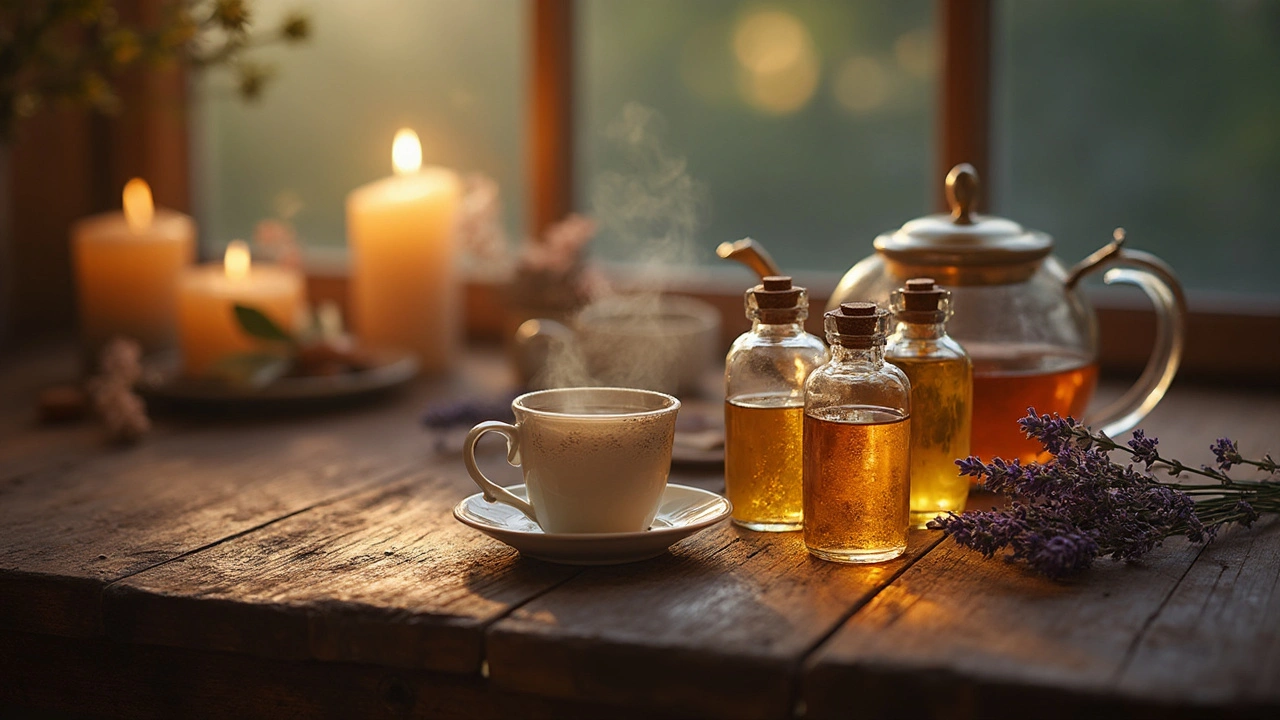
Ever tossed and turned at night, feeling like you're locked in a wrestling match with your mattress? Insomnia can be a real sleep-stealer, leaving you bleary-eyed and grumpy the next day. But what if I told you that a few drops of the right essential oil could change all that? Yep, aromatherapy might be the sleep ally you didn’t know you needed.
So, how does it work? Aromatherapy revolves around using fragrant oils to work magic on your nervous system. Sounds simple, huh? But it’s backed by solid science. Smelling these oils sends signals to your brain to calm things down, making it easier to drift off. You’re sort of tricking your mind into relaxation mode. It’s like aromatherapy gives your brain a little massage.
Imagine setting up your bedroom like a spa—dim lights, peaceful scents, the works. Essential oils like lavender, chamomile, and vetiver are top contenders for inducing those z’s. Studies have shown lavender reduces anxiety, and who doesn’t need a little less of that?
- Understanding Aromatherapy and Insomnia
- Top Essential Oils for Sleep
- How to Use Aromatherapy for Better Sleep
- Creating a Bedtime Routine with Scents
Understanding Aromatherapy and Insomnia
Insomnia is a common issue that affects millions worldwide, leading to frustration and a constant struggle to stay alert during the day. It's not just about having trouble falling asleep; it can also mean waking up too early and not being able to fall back asleep or having a restless night with poor quality sleep. While there are countless sleep aids out there, aromatherapy offers a natural and relaxing alternative to help those tossing and turning nights.
Aromatherapy involves using concentrated plant extracts called essential oils to promote physical and psychological well-being. In the case of insomnia, it taps into our sense of smell to affect the brain directly. This is because the scents from these oils connect with the brain's limbic system, which controls emotions and behaviors, including our sleep-wake cycle. So, in a way, aromatherapy isn't just about pleasant smells; it's about brain chemistry.
Some essential oils have relaxing properties that can help reduce stress and calm the bustling mind. For instance, lavender is celebrated for its ability to soothe anxiety and promote sleep. In a study, participants who inhaled lavender oil experienced better sleep quality compared to those who didn't. It’s like a bedtime story for your brain, helping to slow things down and signal it’s time to rest.
But it's not just about lavender. Chamomile and bergamot are other sleep-friendly oils that ease tension and promote a sense of calm. Blending these oils can create a personalized sleep potion tailored to your needs.
Interestingly, a survey of insomnia sufferers revealed that around 80% of them found improvement in sleep quality after incorporating aromatherapy into their night routine. Although it might not replace medical treatments for severe cases, it stands out as a helpful tool in battling those pesky sleepless nights.
Top Essential Oils for Sleep
When it comes to catching some z's, not all oils are created equal. You've got to reach for the right ones to help you snooze like a baby. Trust me, it could make a world of difference in shifting from tossing and turning to sleeping soundly.
The all-time favorite for sleep aid has to be lavender. This pretty purple flower packs a punch in relaxing your mind. Research even backs it up. According to a study sniffing lavender oil showed improvement in sleep quality among participants. Nice, right?
An old study published in the Journal of Science of Aromatherapy explained,
"Lavender has the potential to increase slow-wave sleep, instrumental for rejuvenating your brain and body."
Next up is chamomile. You might already know it from its tea fame, but in oil form, it's a sleepytime superstar. Chamomile is gentle but mighty, helping to calm anxiety and ease tension that might be keeping you up at night.
Don’t forget about vetiver. It's lesser-known, but this earthy-scented oil is great for stress relief and grounding restless minds. If you're the kind of person whose brain doesn't want to switch off, this might just be your secret weapon.
- Lavender: Known for relaxing properties, it helps with anxiety and improves sleep quality.
- Chamomile: Calms nerves and reduces stress, making it easier to sleep.
- Vetiver: Grounding effect is perfect for quieting an overactive mind.
These oils aren't just here to smell good; they're here to help you beat insomnia over the head and finally get that peaceful night's rest you've been dreaming of. Choose one, or mix a few, and apply them as per your preferred method—be it a diffuser, a massage, or a calming bedtime bath. Sweet dreams!

How to Use Aromatherapy for Better Sleep
So, you're ready to put aromatherapy to the test and kick insomnia to the curb. Great choice! Let’s get you set up with the basics on how to make the most of those essential oils.
First off, grab yourself an essential oil diffuser. This little gadget will be your sleep buddy. It helps disperse the scent throughout your room, making sure you’re surrounded by calming vibes. Fill it up with water, add a few drops of your chosen oil, and let it work its magic.
- Lavender Oil: Known for its relaxing properties. It’s the go-to if you want to unwind after a long tiring day.
- Chamomile Oil: Perfect if you’re looking for something gentle and soothing. It’s like a warm hug in a bottle.
- Vetiver Oil: Great for grounding your mind and body. Think of it as pulling you back down when your thoughts are going a mile a minute.
Apart from diffusers, you can also try a sleep spray. Mix a few drops of essential oil with some water in a spray bottle, then lightly mist your pillow and sheets. This not only freshens things up but also sets the stage for a restful night.
If you’re into baths, this is another great way to integrate aromatherapy. Add a few drops of essential oil to your bathwater along with some Epsom salt, and soak your troubles away before bed. Just keep in mind that a bath should be warm, not hot, so it doesn’t overheat you.
Lastly, consider a nighttime aroma routine. Yep, a few drops on a tissue kept by your bedside or on a diffuser bracelet can provide a gentle scent throughout the night. Small rituals like these signal your brain that it's time to start winding down.
One cool thing? You don’t have to take my word for it—many people swear by these methods and find a noticeable difference in their sleep quality. So, go ahead, give it a try tonight, and see if aromatherapy can become your new best friend in getting those elusive eight hours.
Creating a Bedtime Routine with Scents
Setting up a bedtime ritual is like laying the groundwork for a peaceful night in Dreamland. With the right essential oils, you can make your room a sanctuary that whispers 'sleep' the minute you step in.
First off, pick your bedtime oil. Lavender is a favorite when it comes to battling insomnia. There's something about its soothing smell that makes your eyelids feel heavy. But don't just stop at lavender. Oils like chamomile and vetiver are also champions in the sleep department.
Here's how to nail it down: create a nightly routine. Routines signal your body that it's time to wind down. Aroma is a powerful cue. Think about using a diffuser. Add about 5-6 drops of your selected oil into the water and let it do its thing about an hour before bed.
- Set the mood: As your essential oil whirls through the air, dim the lights or switch to a soft lamp.
- Breathe deeply: Take a few slow, deep breaths. Inhaling the scent deeply can help calm your nervous system.
- Practice quiet time: Unplug from screens and read something calming or listen to soft music.
Worried it might feel like too much? How about sprinkling some drops on your pillow instead? Just a few drizzles can tie your senses to relaxation without feeling overwhelmed.
And if you're really looking to double down, a warm bath with a few drops of essential oil is pure bliss. If you're struggling with sleep, trust me, bringing these soothing scents into your routine is the way to go.





